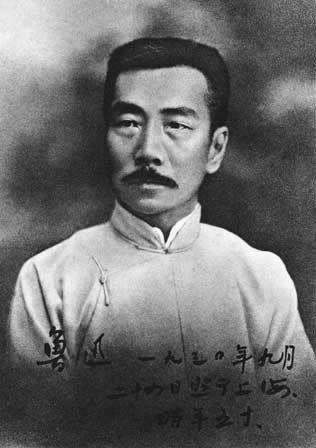周樹人先生
Mr. Zhou Shuren
簡介
Introduction

周樹人(1881年9月25日—1936年10月19日),浙江紹興人,字豫才。原名周樟壽,1898年改為周樹人,字豫山、豫亭。以筆名魯迅聞名於世。他是偉大的無產階級的文學家、思想家、革命家.魯迅的作品包括雜文、短篇小說、評論、散文、翻譯作品,對於「五四運動」以後的中國文學產生了深刻的影響。出版過小說集《吶喊》、《彷徨》,雜文集《墳》、《熱風》、《華蓋集》,散文詩集《野草》、回憶性散文集《朝花夕拾》等專集。其中,1921年12月發表的中篇小說《阿Q正傳》,是中國現代文學史上的不朽傑作。1918年5月,首次用「魯迅」作筆名,發表中國現代文學史上第一篇白話小說《狂人日記》,奠定了新文學運動的基石。五四運動前後,參加《新青年》雜誌工作,成為「五四」新文化運動的主將。魯迅先生以筆為武器,魯迅先生一生寫作計有600萬字,戰鬥了一生,被譽為「民族魂」。
Lu Xun was born in Shaoxing, Zhejiang. As was common in pre-modern China, Lu Xun had many names. His birth name was "Zhou Zhangshou".His courtesy name was "Yushan" but he later changed that to "Yucai". In 1898, before he went to the Jiangnan Naval Academy, he took the given name "Shuren" which means, figuratively, "to be an educated man".The name by which he is best known internationally, "Lu Xun", was a literary pseudonym that he chose when his fiction novel "A Madman's Diary" was first published, in 1918. After the May Fourth Movement, Lu Xun began to work for New Youth.
魯迅精神
Spirits of Lu Xun
1. 立人
1. Li Ren
有人問: 魯迅抨擊了、毀壞了一個舊的社會的秩序,那麽他對建設國家開了什麽藥方嗎?有的。他開的第一味葯,就是"立人"。何謂"立人"?就是培養人,教育人。一個國家,一個民族,要自立于世界民族之林,第一要務,就是培養人。"人力而後凡事擧",此理至明,本不待言。但要成為國人共識,確立為國策,亦殊非易事,需要經歷驚天的反復,經受慘痛的教訓,方能得其真味。 魯迅一生呼喚新人,盡心竭力培養新人,創辦、扶植文學社團十餘,自創出版機構8個,創刊雜誌16本,自費舉辦版畫展覽四次,俯首甘為青年當"梯子",將血滴滴灑在人才園地,遂自漸漸瘦弱,也義無反顧。仔細品味魯迅的"立人"理念,非僅于治國平天下有益,即對修身齊傢而言,亦為金玉良言。
Someone asked ‘ Lu Xun destroyed and condemned the order of ancient society, so what prescription he made for country constriction?’ ‘Definitely. His first prescription is “Establish others”. What is it? Nurturing and educating human. A country, a nation, must stand itself inside the world’s nation, nurturing human is the first mission. ‘After establish others, everything becomes success.’ However, it is difficult to become a consensus of citizens, it needs tremendous repetition and tragedy. Lu Xun spent his whole life to call new people and nurture them. He funded dozens literature communities, 8 publishing organizations, 16 magazines, spent money for organized print exhibition four times. He was willing to be teenagers’ ladder, watering and caring many talented teens, never regretted even his health condition worsening. When you detailing the concept about ‘Li Ren’, not only beneficial for ruling the country, but also all human being.
2. 獨立思考
2. Independent Thinking
魯迅的一生,最貴獨立。早年服膺"摩羅"拜倫等,乃從其為獨立而獻身之精神。又曾屬意尼采,亦取其獨立自強之立意。1907年,魯迅在日本留學時,就大聲疾呼"尊個性而張精神","任個人而排眾數",皆極注重獨立思考,最忌人云亦云。 本此理念,一生特立獨行,敢走無人走過之路,敢闖刀尋覓小詩。寧可運交華蓋,彷徨於無地,也不奴顏婢膝,為五斗米折腰。只要能切切實實,足踏在地上,為中國人流血奮鬥,贏取民族解放,便"躲進小樓成一統","花開花落兩由之"。人心的真正解放,才是魯迅終生的追求。 魯迅文摘:首在立人,人立而后凡是舉。
Independence is the most important in Lu Xun’s life. He was admired Byron in his early life, learnt the spirit of independence and devotion from Byron. Lu also like Nietzsche, got Nietzsche’s concept of strengthen oneself. In 1907, Lu studied in Japan, he voiced ‘respect personalities and spread out spirit’, ‘become individual and no plural’. He emphasized independent thinking, hated following the herd. Lu followed this idea in his whole life, willing to go thorough many difficulties that no body suffered before. Lu would not surrender his principles for any interests. He only dependable and steady, fight for Chinese people to win freedom of nation. ‘Citizens’ mind have truly liberate’ in which Lu pursuing lifelong.
3. 拿來主義
3. Borrowlism
"拿來主義",乃出於魯迅獨創。 "拿來"者,自主擇取,而非被動"送來";要運用腦髓,放出眼光,自己來拿,而非連同鴉片煙、姨太太一同照單全收。清醒者,要占有,選擇,或使用、或存放,或毀滅,才能成為新人、新文藝。 他對傳統文化用舊瓶裝新酒之法,對外來文化採去蕪存菁之方,選擇有利強國富民之策。他翻譯外國文學,專挑弱小民族文學,以"立意在反抗,指歸在動作"為選擇取向。他又翻印外國版畫,意圖有利於國內學子觀摩。 魯迅文摘:用自己的眼睛去讀世間這一部活書。
‘Borrowlism’ is created by Lu Xun. ‘Giver decided give and take by him/herself but not give passively; think twice and become insightful, come and get him/herself, do not follow others who received everything even it is inferior for yourself. People who are awake need to occupy, make a choice, or utilize, or save, or destroy, to be a new person, new art. Lu’s considered traditional culture with using ‘put new wines in old bottles. For some foreign cultures, Lu tried choosing the best and filtered. He translated foreign literatures especially from weak nation. ‘Focus on against and movement’ is Lu direction of choosing literature. Lu also copied foreign printings, beneficial for Chinese students to have a observation.
4. 韌性的堅守
4. Perseverance
韌性抗爭命運,亦為魯迅所倡導之精神。魯迅自幼遭受磨難,歷盡艱辛,在韌性的堅守和頑強的抗爭中走向了成熟,走出了國門。繼又在韌性堅守中苦學、回國任教、抄古碑、創辦博物館、圖書館,到處兼課,熬夜創作,力挺女師大學生風潮,抨擊黑暗,抗擊愚昧。 "無論愛什麼,一 飯,異性,國,民族,人類等等。。。。。。。只有糾纏如毒蛇,執著如怨鬼,二六時中,沒有已時者有望。"常慨嘆中國少有失敗的英雄,少有韌性的反抗。甚至天津的"青皮"身上的無賴然而"韌性"的精神,也值得吸取。"正無需乎震駭一時的犧牲,不如深沉的韌性的戰斗"。正式秉持這種精神,魯迅堅韌的一生,贏得了世人的廣泛崇敬。
The density of tough protest is also the spirit which Lu Xun advocated. Lu suffered lots of obstacles and adversities in his childhood. Stick to toughness and rebellion made Lu became mature. Lu also stick to toughness of his studying, back to China became a teacher, funded museum, library, doing creation overnight, completely support the movement of Beijing Normal University, Blamed the darkness and foolish. ‘No matter what, one rice, different gender, country, nation, human beings,etc. Only the genius who hard-working a lot and working day and night can have the opportunity to become success. ‘Always signed only few failure heroes in China, a handful of stick to toughness.’ ‘No need to focus on a moment of sacrifice but deepen in sticking to toughness.’ Lu Xun upheld this spirit, he gained people appreciation of his life of toughness